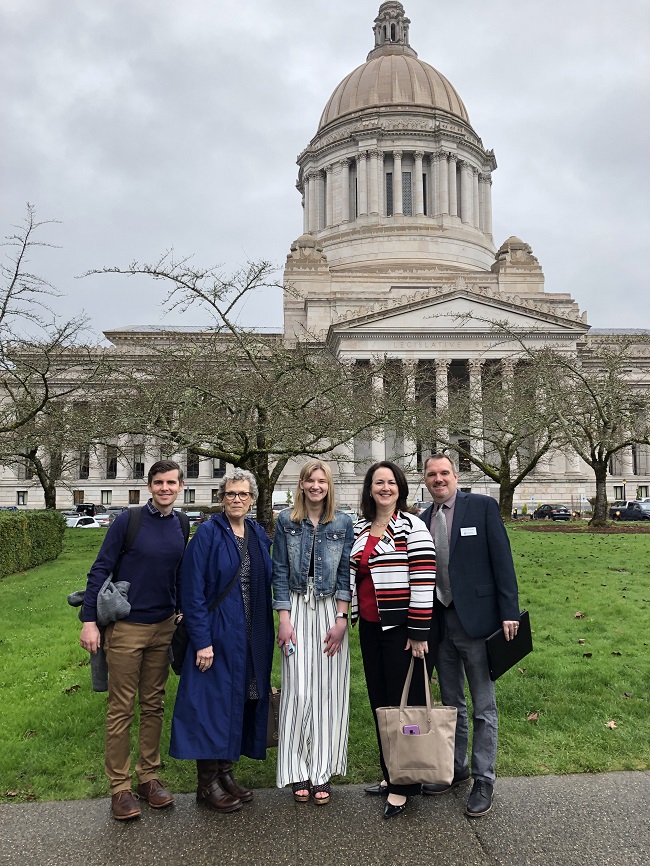The Washington Privacy Act Comes to the People’s House

Every day that we use our smart phones and computers, we leave behind a digital trail of data regarding our movements, online searches, shopping choices, work, and fitness activities. With increasing frequency and often without our awareness, this data is used for targeted advertising or sold directly to another company. This year two competing proposals to regulate the collection and use of consumer data have been introduced. In conjunction with the ACLU, I have introduced the People’s Privacy Act. In the Senate, Sen. Reuven Carlyle (D-Seattle) has reintroduced the Washington Privacy Act. Both bills seek to create new privacy rights for our consumer data. Both bills would give consumers the right to decide what data companies collect on you, for what purpose it can be used, who can use it, and to have it deleted.
However, the People’s Privacy Act goes farther in two important ways. The first is that it would make data collection an opt-in feature as opposed to the current opt-out option that most companies and applications offer. Instead of having to request that companies delete your data, you could simply never allow them to access it in the first place. The second important distinction is that the People’s Privacy Act includes a private right of action. This would allow an individual to sue a company that was violating their data privacy rights. Under the Washington Privacy Act, only the Attorney General can enforce violations under the Consumer Protection Act. I believe that a right is meaningless if there is not a mechanism for an individual to enforce that right.
Unfortunately, only the Washington Privacy Act is moving forward this week after the “policy committee cutoff,” one of the Legislature’s deadlines for legislation to move through the committee process. Thankfully, the Washington Privacy Act will be heading over to the House to be heard in the House Civil Rights & Judiciary Committee. Having set out the principles we believe in with the People’s Privacy Act, I am hopeful that here in the House, we can continue to shape this bill and ensure that the Washington Privacy Act creates a meaningful way to enforce these new rights. I will continue to fight for consumer-focused data privacy protection. Hopefully the People’s House can make sure that the consumer perspective will be reflected in any data privacy legislation and that we can get it passed this year.
Protecting Students with Seizure Disorders

Students with seizure disorders deserve to feel safe at school knowing that their teachers will know what to do if they suffer from a seizure. That is why I introduced HB 1085 which will require school districts to create Individual Health Plans for students with seizure disorders, similar to what schools already do for students with diabetes and life-threatening allergies. IHPs have proven to be a powerful tool to protect students with health issues and we should make them available for students with seizure disorders.
Thanks to the advocacy from the Epilepsy Foundation of Washington, we are one step closer to passing this bipartisan legislation. This week HB 1085 passed the House Education Committee and is heading to the full House for a vote. All children deserve access to a high quality education. This bill will allow students with seizure disorders the peace of mind to focus on learning.
Providing Communities with Tools to Preserve Affordable Housing
HB 1035, my bill to create tools for local governments to grant rent relief and preserve affordable housing, was heard in the House Finance Committee last week. The lack of affordable housing options in many Puget Sound communities hurts low income residents and can result in workers being forced to commute long distances. Our communities should be home to people of all income levels. Sadly, the bill came up against some opposition out of the blue and at the last possible minute, and I was unable to resolve the concerns in time to have the bill move to the next phase. For now, the bill will not advance. I am grateful for the advocates who spoke out in favor, and I am committed to bringing it forward again next year.
The bill will authorize cities and counties to create affordable housing incentive programs which can grant property tax exemptions to multifamily buildings at least 25 years old and accessory dwelling units to single-family homes, house tenants earning up to 50% of area median income for multi-family and up to 80% of area median income for accessory dwelling units. This can be a win-win for renters AND landlords. This will keep rents affordable in these properties and help to decrease the property tax bill for owners who provide this housing. Healthy communities have room for people of every income level and this bill will help cities and counties incentivize that.
Thank you all for taking to the time to read this newsletter and for taking an interest in our progress in the House of Representatives. If you have any questions, inquiries, or concerns please feel free to contact me with the info below.
Sincerely,

Shelley Kloba
Representative, 1st Legislative District
Washington State Legislature
